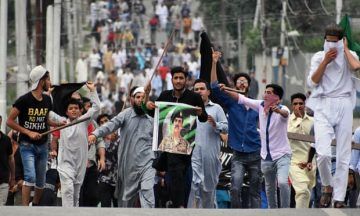Preti Taneja in The Guardian:
 Seventy years after partition, the annexation of Kashmir by India is the endgame of Devraj, the Hindu nationalist businessman protagonist of my 2017 novel We That Are Young. His tactic is settler-colonialism: he is opening a seven-star hotel in Srinagar. But according to Article 370 of the Indian constitution, which among other protections prohibited non-Kashmiris from owning property there, he should never have been allowed to build it. In real life, Article 370 was last week unilaterally abolished by the Indian government. The Kashmiri population were placed under lockdown; there was a shortage of medicines and baby food, people were not able to speak to family members outside the state. Reports emerged that police used tear gas and pellet guns to break up peaceful protest. The international community was caught off guard. But Kashmir has long been known as the most militarised region in the world. Trapped between India and Pakistan, the people have suffered decades of human rights abuses and state-sanctioned violence. The mass of papers in the UN archives since 1947 reveal much international diplomacy, but a lack of political will to intervene.
Seventy years after partition, the annexation of Kashmir by India is the endgame of Devraj, the Hindu nationalist businessman protagonist of my 2017 novel We That Are Young. His tactic is settler-colonialism: he is opening a seven-star hotel in Srinagar. But according to Article 370 of the Indian constitution, which among other protections prohibited non-Kashmiris from owning property there, he should never have been allowed to build it. In real life, Article 370 was last week unilaterally abolished by the Indian government. The Kashmiri population were placed under lockdown; there was a shortage of medicines and baby food, people were not able to speak to family members outside the state. Reports emerged that police used tear gas and pellet guns to break up peaceful protest. The international community was caught off guard. But Kashmir has long been known as the most militarised region in the world. Trapped between India and Pakistan, the people have suffered decades of human rights abuses and state-sanctioned violence. The mass of papers in the UN archives since 1947 reveal much international diplomacy, but a lack of political will to intervene.
Curfewed Night is the Kashmiri writer Basharat Peer’s moving memoir. He was just 13 years old in 1989, when the separatist movement turned violent. He writes of the desire for self-determination, the brutal Indian response. Of the friends who left their villages to train as fighters in Pakistan; of those who “disappeared”, possibly to Indian torture centres run off‑grid; and the “half widows” left behind.
More here.
